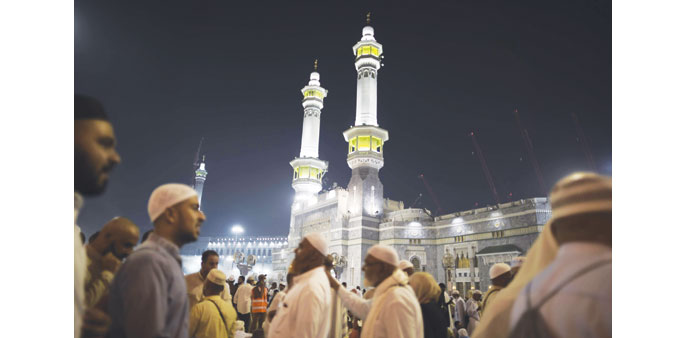Crown Prince Mohamed bin Nayef says the kingdom always “takes into consideration the safety of pilgrims as a priority”
AFP
Makkah
The safety of pilgrims travelling to Saudi Arabia is a priority, the crown prince said yesterday, assuring that a deadly crane accident at Islam’s holiest site will not affect this year’s Haj.
Prince Mohamed bin Nayef was referring to a tragedy a week ago, when a massive crane being used in work on an expansion of Makkah’s Grand Mosque toppled into a courtyard, killing 108 people.
Another 402 people were injured.
Prince Mohamed, quoted by the official Saudi Press Agency, said the kingdom always “takes into consideration the safety of pilgrims as a priority”.
The incident has been dealt with “in record time with the directives issued by King Salman and.... has no more effect whatsoever on the Haj plans for this year”.
The prince, who is also interior minister, on Thursday reviewed a parade and drill by security officers demonstrating their readiness to protect the Haj from attacks or accidents.
On Tuesday, King Salman sanctioned the contractor, Saudi Binladin Group, after he reviewed an investigative committee’s findings that the firm was “in part responsible” for the crane collapse during severe winds.
He ordered prosecutors to prepare an indictment, excluded the company from new public projects and forbade its executives from leaving the country pending the completion of legal action.
Saudis, Iranians, Nigerians, Malaysians, Indonesians and Indians died in what was the worst Haj-related accident in years.
Nine of the dead have yet to be identified, Health Minister Khaled al-Falih said on Thursday, with another two bodies still thought to be under the remains of the crane.
More than 1.2mn faithful have already arrived for the Haj, which begins on Tuesday.
From all races and ages, they flocked into the Grand Mosque, where they prayed—some silently in tears and others loudly in groups carrying their countries’ flags.
“Do you see the number of people here? Do you think they are fearful? It is quite the opposite. People here have faith in God and perceive those that died as martyrs,” said Amin al-Rahman of Bangladesh.
Samira Abdulwahab, a pilgrim from Sudan who had just finished circling the Kaaba, called the Grand Mosque “the safest place in the world”.
Since March, the kingdom has led an Arab coalition conducting air strikes and supporting local forces in Yemen against Shia Houthi rebels.
This year’s pilgrimage coincides with a refugee crisis in Europe after millions of asylum seekers, most of them Muslim, fled wars in Syria, Iraq and Afghanistan.
The Islamic State group, which has carried out widespread atrocities, has seized swathes of Syria and Iraq.
IS has also killed dozens of people this year in bombings at Shia mosques in Saudi Arabia, Yemen and Kuwait.
Ahmed Nour, a Syrian living in Jeddah, said there were worries about the threat from the Houthis as well as IS.
“But I think that authorities here are well-prepared”, said Nour, who will undertake the pilgrimage this year.
A challenge again facing the Haj is potential transmission of the deadly Middle East Respiratory Syndrome coronavirus (Mers-CoV).
The capital Riyadh saw a jump in infections last month.
But Health Minister al-Falih said all pilgrims are so far in “very good, if not excellent health”.
Saudi Arabia is the country worst affected by Mers, with 528 deaths since the virus appeared in 2012.
The health ministry has mobilised 25,000 additional medical staff to support the Haj, but says there has never been a case of Mers among pilgrims.
Worshippers spoke of their elation at attending an event that marks the peak of their spiritual lives.
“We feel tremendous. We’re very, very excited,” said Fawzy Abdulrahman, 59, from the Philippines.
“We’re praying for our kids,” he said, holding his wife’s hand and melting into the crowds.

Pilgrims leave after performing the Maghrib prayer at Makkah’s Grand Mosque yesterday.
